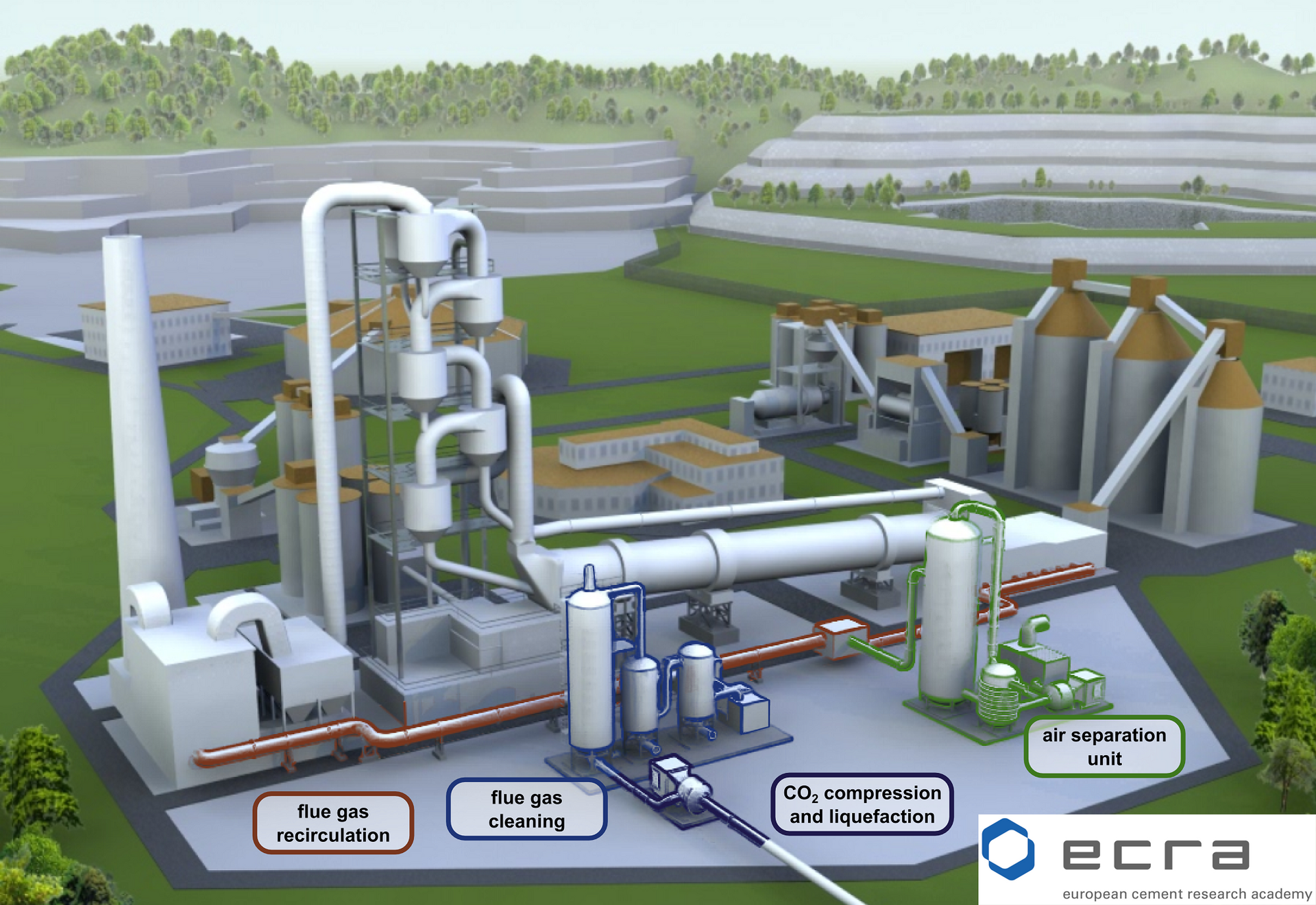CCS: Carbon Capture and Storage
The demand for cement and concrete construction materials will continue to increase significantly due to the long-term growth of the global economy and the development in many markets of the world. As a major global CO₂ emitter, the cement industry is focusing strongly on technologies for the mitigation of global CO₂ emissions, among which carbon capture and storage will play a key role.
The capture of carbon dioxide and its geological storage is a technology capable of reducing CO₂ emissions significantly. Against this background, ECRA has been working on carbon capture since 2007 in a long-term research project to examine the capture of carbon dioxide as a prerequisite for its safe geological storage, and the technical and economic feasibility of this technology as a potential application in the industry.
ECRA’s CCS project comprises several phases. Phases I - IV.B have been completed, with a major focus on Oxyfuel technology and the possibility of initiating an industrial-scale Oxyfuel kiln. ECRA lays strong emphasis on the global perspective of its research and also on sustainability. This implies that not only CO₂ emissions as such, but also the huge energy demands for operating CCS plants are taken into account.
It is already clear that capturing CO₂ in cement plants is technically feasible. The question of what to do with the captured CO₂, however, remains. ECRA’s current main focus is therefore to highlight the topic of CO₂ infrastructure, which is indispensable in order to enable captured CO₂ to be safely transported from its source to suitable storage sites or utilisation plants.

ECRA CCS Project: Technical reports
ECRA CCS Project Phase IV.A
Download as PDF file
ECRA CCS Project Phase III
Download as PDF file
ECRA CCS Project Phase II
Download as PDF file
ECRA CCS Project Phase I
Download as PDF file
Continued cooperation of ECRA and UMONS
On 16 March 2022 ECRA and UMONS were delighted to celebrate the ninth anniversary of the foundation of the ECRA Academic Chair. In a small ceremony held on the occasion of the recent Scientific Committee meeting of the Chair, the Rector of UMONS, Professor Philippe Dubois, underlined the successful cooperation between UMONS and ECRA as well as the importance of the topics which are being jointly addressed.
A review of the past nine years of achievement supporting the implementation of carbon capture and utilisation in the cement industry has been compiled in a document summarising the scientific work which has been undertaken to date, including four completed PhD theses, two still in preparation and also many master and bachelor works.
ECRA and UMONS will continue their cooperation in the time ahead. The Rector, together with the Vice-Rector for the promotion of regional and inter-regional partnerships at UMONS, Professor Diane Thomas, and Dr. Martin Schneider, Managing Director of ECRA, signed a Memorandum of Understanding to underline this extended cooperation. The challenge of reducing CO2 emissions in the cement industry will remain paramount, and the academic competence centre which has been built by the team at UMONS in cooperation with ECRA will continue to make a significant contribution towards facilitating the transformation of the cement industry.

Figure 2: Prof. Diane Thomas (Academic and Scientific Coordinator of the ECRA Chair at UMONS), Prof. Philippe Dubois (Rector of UMONS) and Dr. Martin Schneider (Managing Director of ECRA) sign the memorandum of understanding ensuring the continued cooperation between ECRA and UMONS.
Establishment of the ECRA Academic Chair at the University of Mons in 2013
In 2013 ECRA established an academic chair entitled “CO2 to Energy: Carbon Capture in Cement Production and its Re-use” at the University of Mons (UMONS) in Belgium within the UMONS Research Institute for Energy.The main objective of the chair is to create a centre of scientific expertise in the specific field of carbon capture and re-use in cement production, and to promote research and innovation. It supports research activities by financing fellowships for postdoctoral researchers, PhD students and undergraduate students. A particular research focus is placed on:
- Post-combustion, partial oxyfuel and total oxyfuel CO2 capture applied in the cement industry
- Flue gas treatment in CO2 capture (in particular de- NOx and de-SOx) that can be applied by absorption or adsorption; this includes not only oxyfuel combustion but also micro-pilot studies and projects on capture technologies as post-combustion
- The reuse of CO2 which can be achieved by various processes which convert CO2 into methanol or other compounds while benefitting from renewable electricity.
